The Giro d’Italia starts this Friday in Hungary and ahead lies over three weeks of racing. That much we know, the hard part is rating all the contenders and pretenders for the maglia rosa because so many have question marks about their form, their season so far or their consistency during a grand tour.
Richard Carapaz is the deductive choice in the absence of Tadej Pogačar and Primož Roglič because when they’ve beaten him he was at last often on their wheel while all the others had been dropped. Yet Carapaz hasn’t had it easy this season and it’s far from certain he can hold it together for three weeks. It makes for an enticing race, any emerging hierarchy we see atop Etna could be altered at the Blockhaus and rewritten again and again in the Alps.
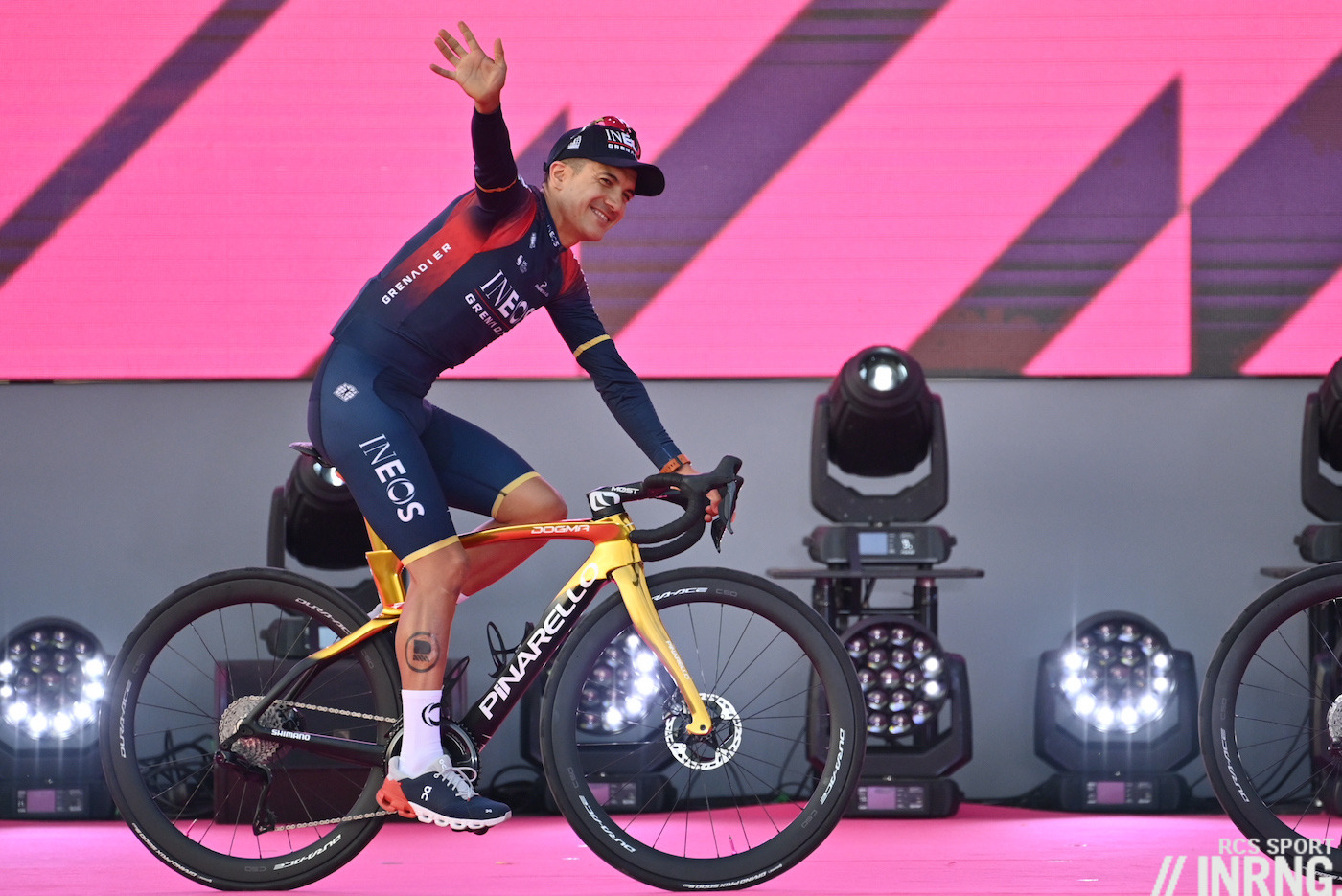
Richard Carapaz leads Ineos. The Giro winner in 2019, he’s gone on to finish on the podium of the Tour de France and Vuelta a España since. As they say in Italian, “he who sleeps doesn’t catch fish” and with Primož Roglič and Tadej Pogačar both sitting this Giro out, the Ecuadorian stands to net the big prize in Verona. If he’s in form similar to last July then he’ll be ahead of the rest. He’s got a strong team with Ineos having won the two last editions of this race after Carapaz won. While Tom Pidcock was due to ride, his absence now means there’s even more of a GC focus. Frenchman Pavel Sivakov is an outsider, a Plan B. Richie Porte seeing out his last season as a road captain in the race where his career took off thanks to a spell in pink and normally he’s cracked under pressure when burdened with leadership in grand tours but just like his last year with Trek-Segafredo saw him on the podium in the Tour de France he can race untroubled. The only question for Carapaz is form and consistency after an intermittent season so far with several crashes and while he’s excellent in the mountains it’s rare for him to stand up on the pedals and just leave everyone behind. Instead the “Locomotive of Carchi” will often sneak away on a false flat instead after wearing down his rivals, he won the Giro on the road to Courmayeur like thi,s and took the Olympics with a crafty attack too. This time he’ll be heavily marked and the one rider the others won’t want to let get away. It’ll also be interesting to see how Ineos race, will we see the Ineos 2.0 that promises entertainment or once Carapaz gets the lead if it reverts to the Sky mountain train tactics of old to ensure they at least win a grand tour this season?
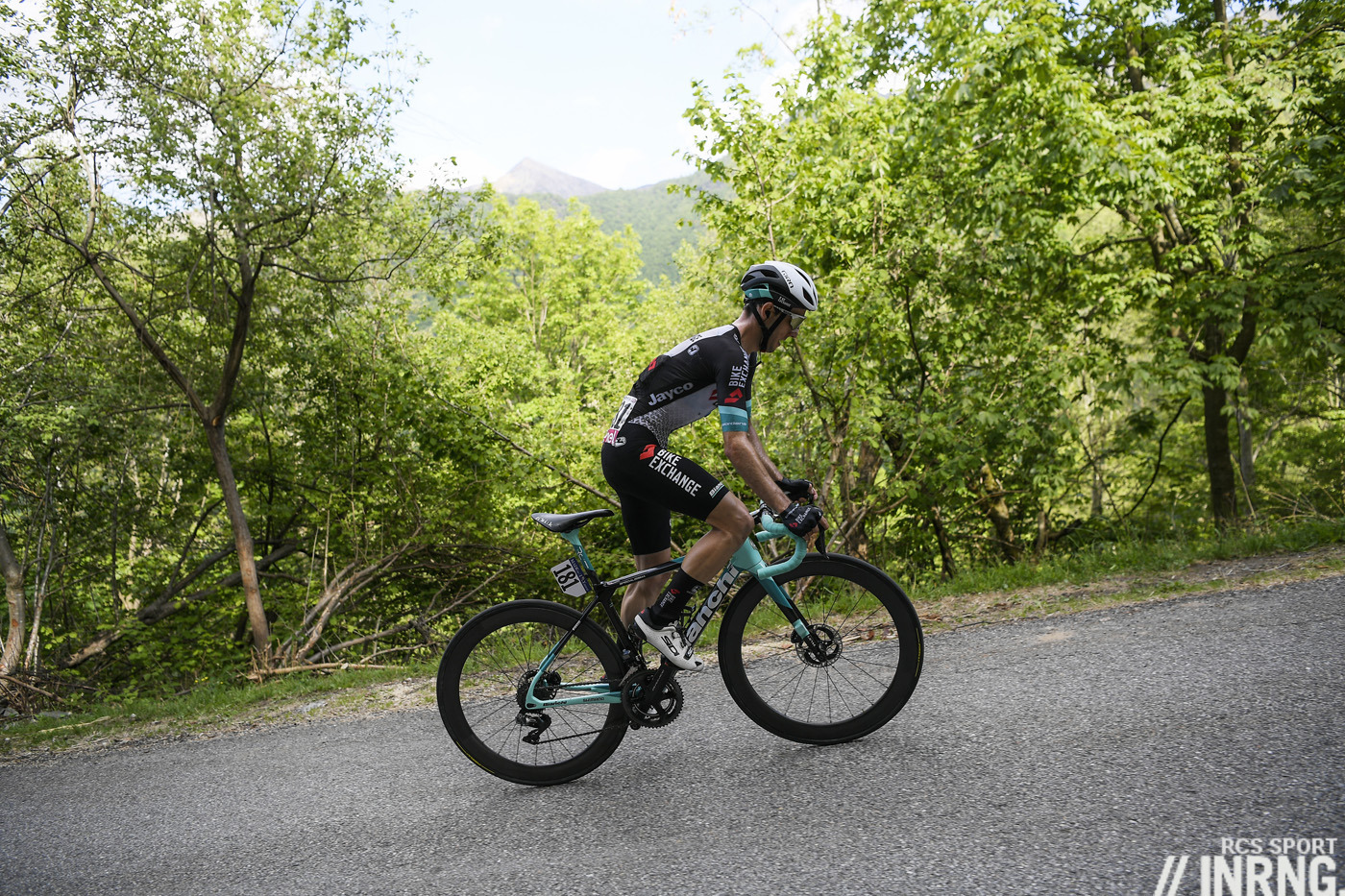
“If at first you don’t succeed, try again” might be the motto for Simon Yates who has come close to winning the Giro but been thwarted many a time. That collapse in 2018 after 13 days in the maglia rosa stands out, but there was Covid in 2020, and he started last year’s race with an injury that saw him lose time early on before recovering but too late to mount a GC challenge, just an impressive stage win. BikeExchange-Jayco bring a solid team in total support especially if Lucas Hamilton’s ready. How to beat Carapaz? Directly as at his best Yates can jump away on a climb and take time and he’s improved a lot in the time trials too. He had a wobble in the recent Vuelta a Asturias when he overheated and if only for recency bias this raises a concern. But he’s coped well in all conditions, having won a scorching Vuelta and frosty stages of Paris-Nice.
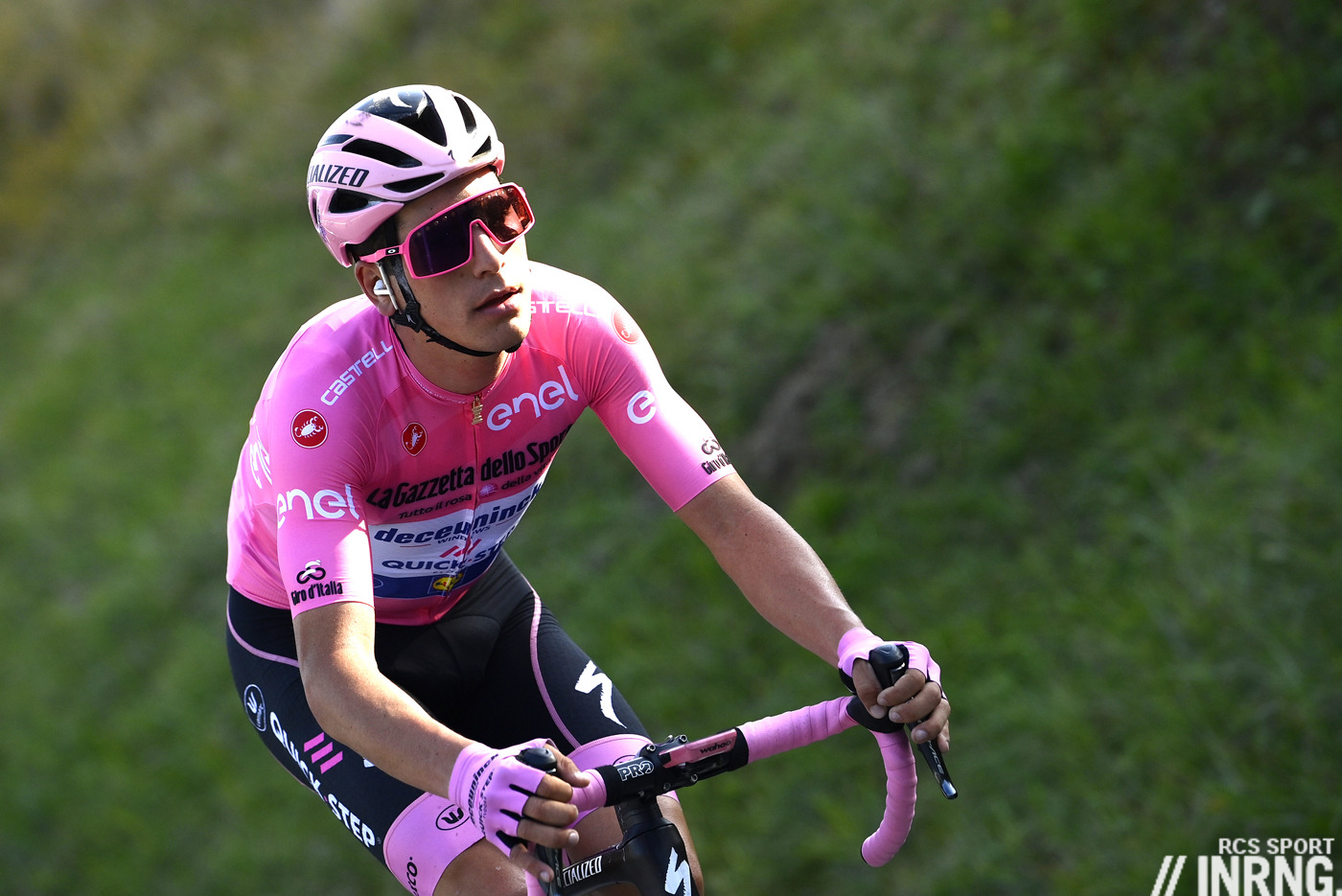
João Almeida has made his name in the Giro and this race looks to be his future as long as team mate Tadej Pogačar has to win to the Tour de France to satisfy their sponsor UAE. The Portuguese powerhouse would prefer more time trials but the one 26km stage does give him an advantage over rivals, in last year’s Milan time trial he put over a minute into most GC rivals. Now circumstances, the course in Verona mean it’s not the same but it’s a card he gets to play that others don’t necessarily have. Instead Almeida’s weakness has been the high mountains in the past but the gap’s been closed of late and he’s among the best now even if he’s still 23 and eligible for the white jersey this year and next so there’s no pressure to win and his UAE team are handy for stages along the way, they also bring Fernando Gaviria for the sprints so while Almeida’s not got a whole team behind him, he’s arguably got more support than he had with stage-poachers Quick-Step before.
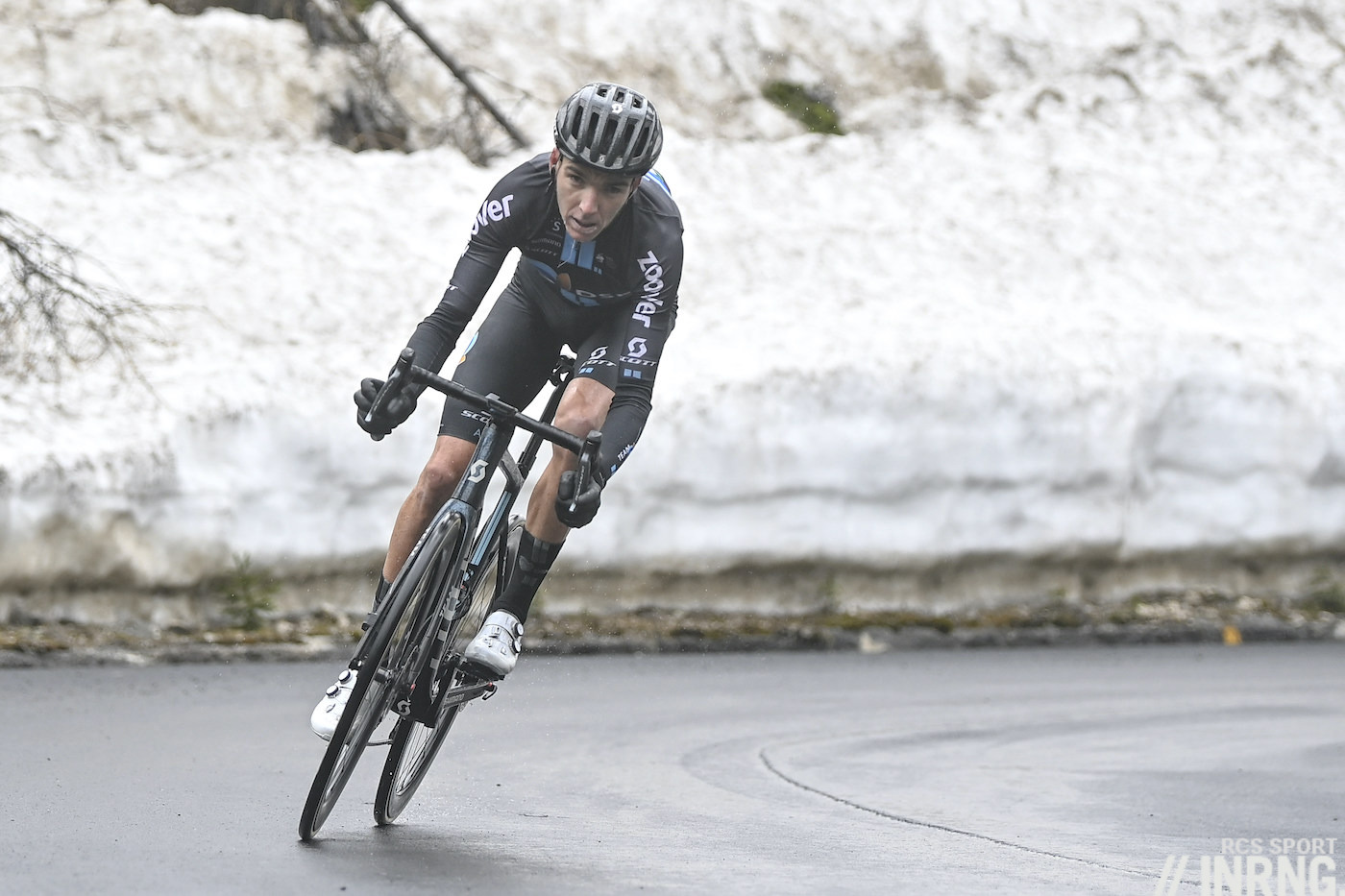
Romain Bardet is fresh from winning the Tour of the Alps and where he was sprinting for stages so the only concern about form is whether it lasts for another month, right now he’s purring about his form being “optimale“. At his best he can piece together an excellent three weeks and is both reliable and daring when he needs to be. His weak point is the time trials to the point where even 26km are problematic and this has been a big factor in why he’s won so few stage races, the recent Tour of the Alps had none. DSM also bring “Dutch Indurain” Thymen Arensman who’s 22 and has banked two Vueltas and now comes to see how far he can go on GC and will be an understudy.
It’s not a trident, it’s ein Dreizack for Bora-hansgrohe who come with Jai Hindley, Emanuel Buchmann and Wilco Kelderman. But how to win? Hindley’s struggling to repeat the form that saw him finish second here in the autumn of 2020, he fell ill ahead of Liège-Bastogne-Liège so just a consistent top-10 would be ok. Buchmann has been fourth in the 2018 Tour de France but that’s his only grand tour top-10 so again we’ve seen him able to ride with the best but consistency is the challenge. Kelderman would prefer more time trials because he’s vulnerable in the high mountains and could be the more consistent pick, remember he was fifth in the Tour de France last summer but a result achieved without leaving much of a mark on the race, he could be on the podium but winning’s a tall order. Giovanni Aleotti could almost be the fourth prong, the 22 year old’s one to watch.
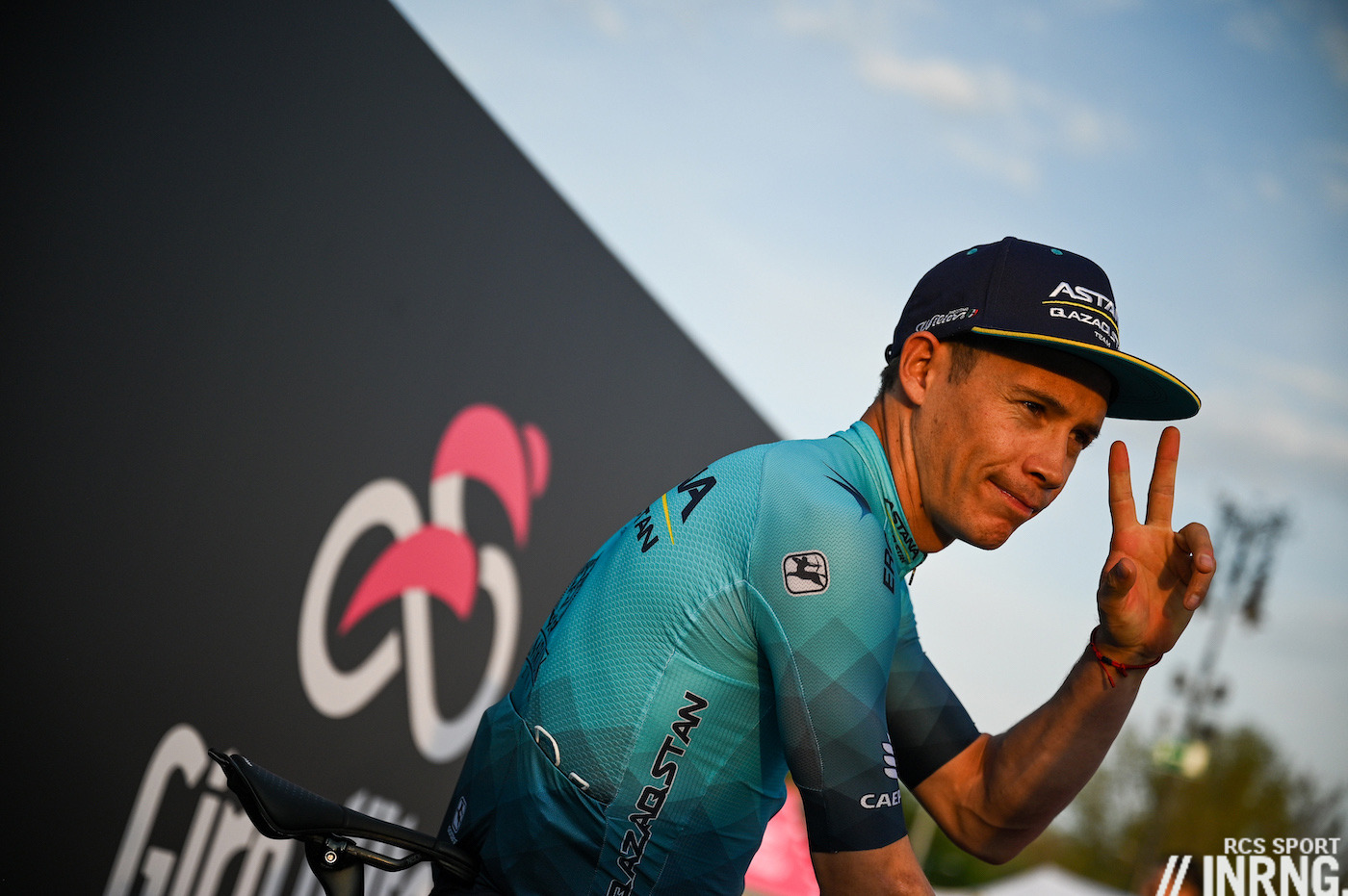
Astana come with Vincenzo Nibali. Over the years it’s been ruinous for his rivals to overlook him but this time the Giro has the hallmarks of a farewell parade for one of the all time greats of Italian cycling, but hopefully a high level one, the form’s coming along and a stage win’s possible. He can play a vital role for Miguel Angel Lopez (pictured). The Colombian can ride away from the field on a summit finish and has been on the podium in the Vuelta and Giro but the top step here? To finish first, first finish because he hasn’t completed a grand tour since the 2020 Tour de France thanks to crashes and tantrums. Astana used to be terrifying force in the Giro but have had a dire start to the season, so it’s on them to see if they can gather around Lopez.
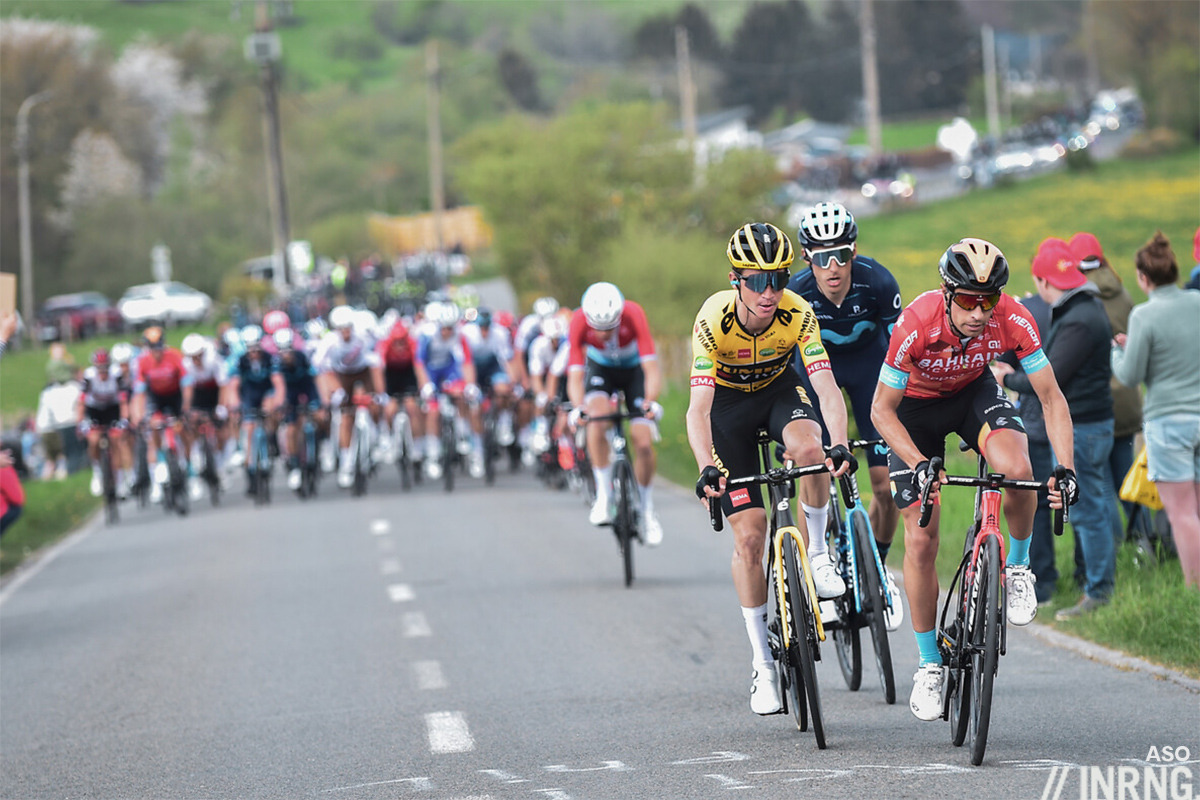
Bahrain bring Mikel Landa and Pello Bilbao and come with GC intentions. Landa’s reputation precedes him now, the myth is further up the road than the man and to mention him is to imagine him attacking uphill in the drops… then falling over or falling ill. That’s part of the charm but Bahrain will want to temper this and, like many of the names cited above already, consistency is the challenge. Bilbao’s also an exciting rider, a fearless descender, he can aim to improve on his fifth place in the Giro of 2020 but the competition’s bigger this time and while he’s been winning of late he also had a collapse on the last day of the Tour of the Alps. The Basque tandem promises plenty with Santi Buitrago and Wout Poels for more climbing power on a team that will also contest the sprints with the artistic Phil Bauhaus.
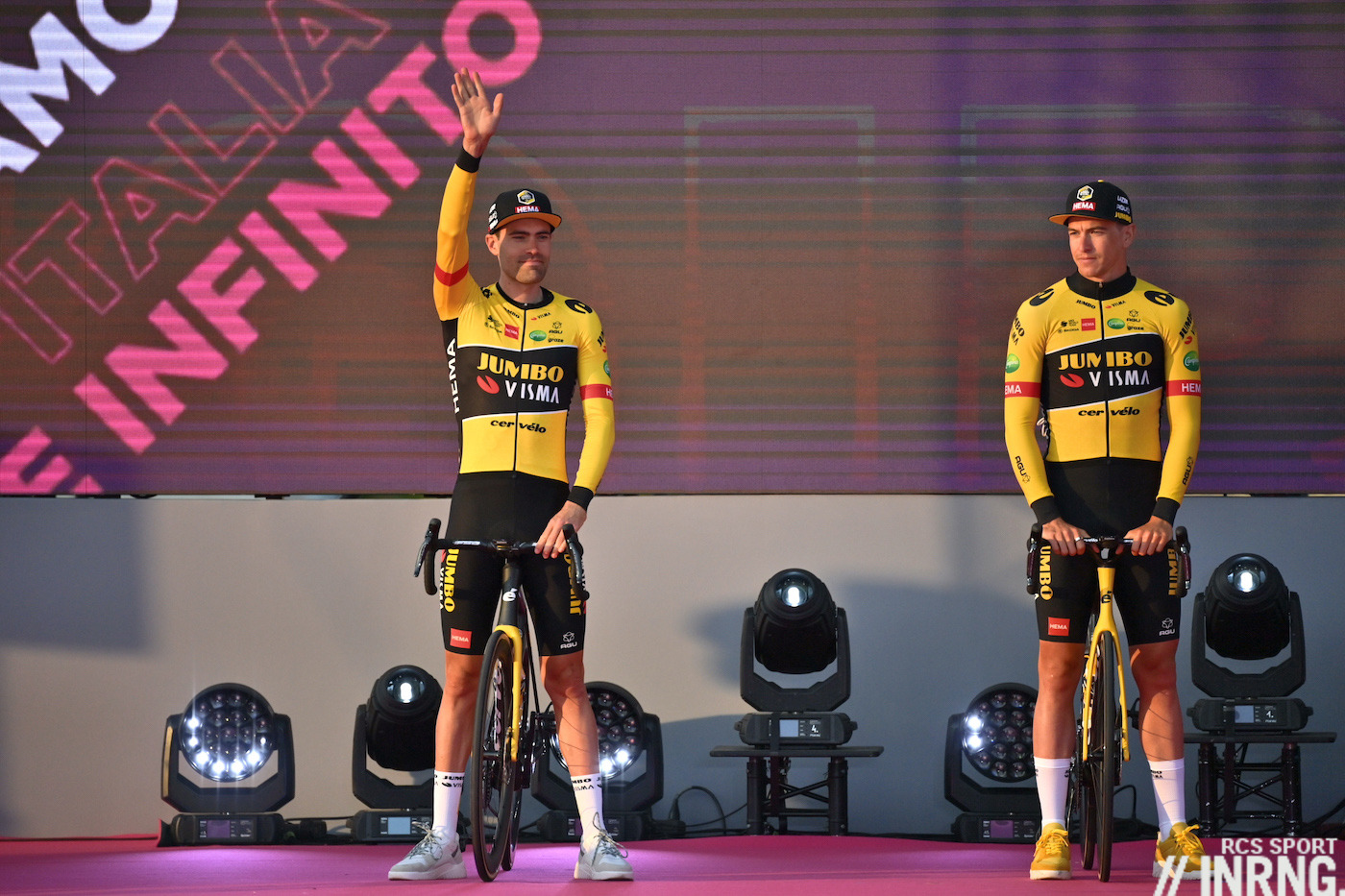
Not long ago Tom Dumoulin looked to have the grand tours at his feet. He’d won the Giro, been second in the Tour de France and because he could climb with the best and smoke them in the time trials to the point that if he could build on his 2018 form, he could take on Team Sky in the Tour de France. But if it looked easy on the outside, it was too much and he needed a career break. The form’s a big question now, in his own words he’s “a bit behind” thanks to back problems and Covid, and if he’s happy to ride the Giro, he wouldn’t design this course. With all of this expectations are reset but this means he can surprise on the upside, let’s hope so. Tobias Foss and Sam Oomen are capable support for Dumoulin but if he’s not up for the “fight for pink”, watch to see what they can do too although a high GC and a stage win would be something rather than the win outright.
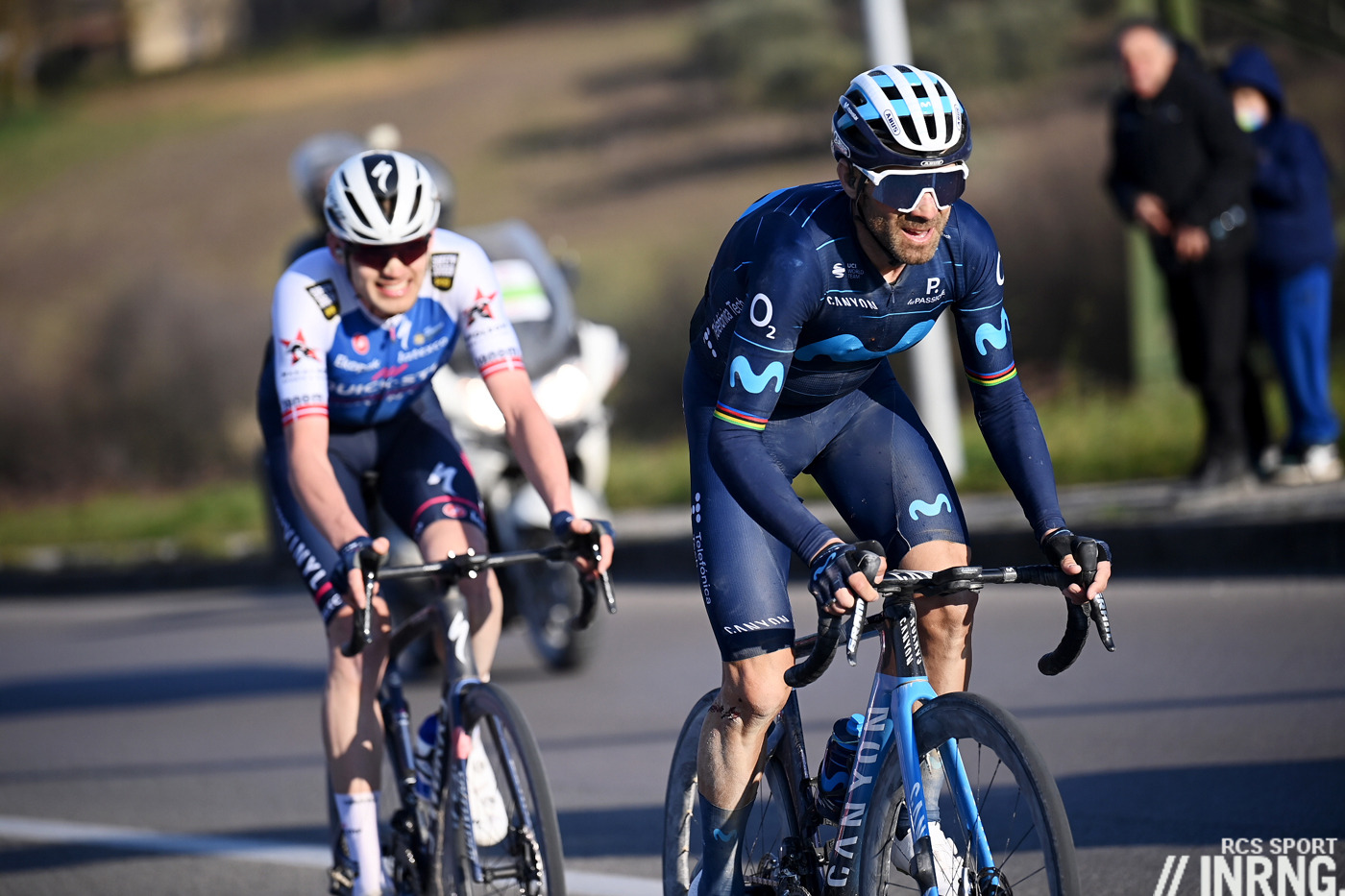
It’s said the weak point for Alejandro Valverde is racing above 2,000m altitude, well he’s got a course that rarely strays so high although is it really altitude or just long climbs of 40 minutes or more? This is his last season and he’s still racking up results and determined to retire at the top. So what to do, a stage win with panache, or does he leave Movistar with a parting gift of hundreds of UCI ranking points from a high GC place? Both he’d reply. Team mate Ivan Sosa is the yang to Valverde’s yin, not the opposite but complementary as he’s climbing very well and would like more high altitude. Can he race consistently across three weeks? A big talent, he’s been on team duties at Ineos before so we don’t yet know how he’ll fare as a co-leader.
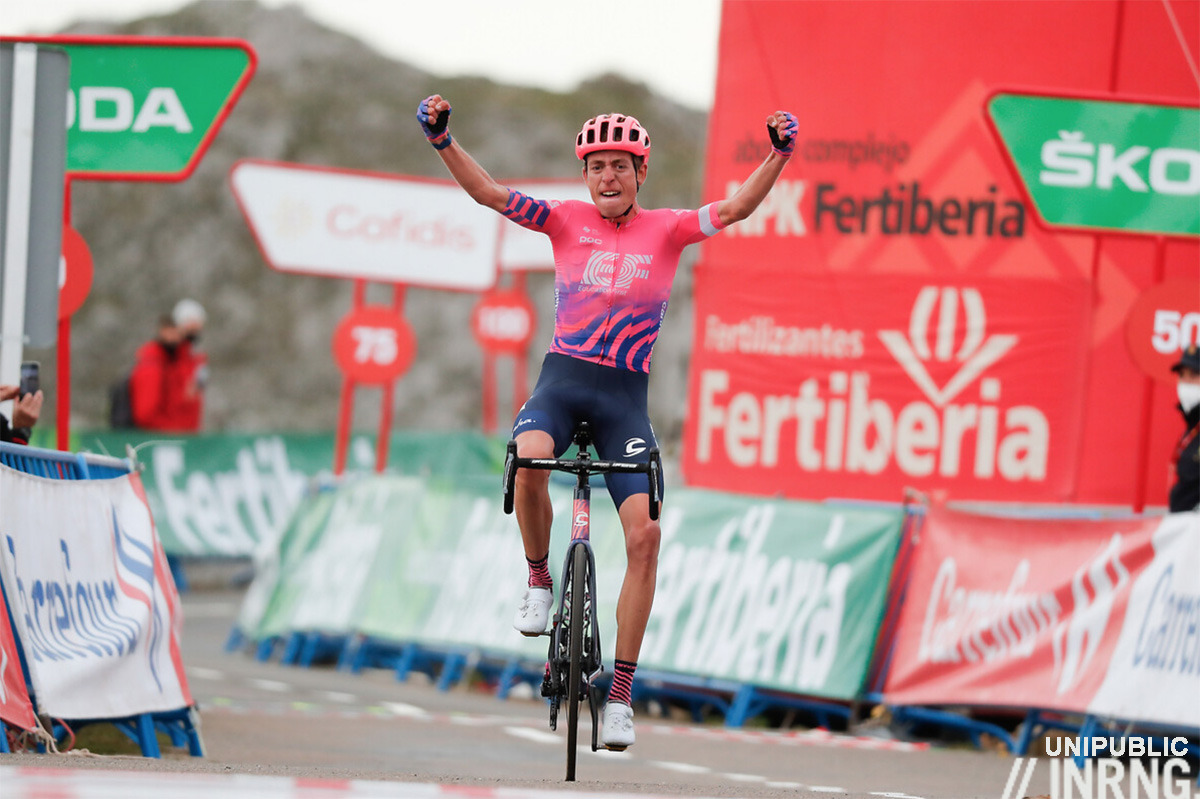
Hugh Carthy is the stork-limbed stoic sort who’s been on the podium in the Vuelta when you might think he’s better suited to the longer climbs of the Giro. At his best he’ll be a constant present among the contenders and can take a stage but how to win? The EF Education team come with plenty of other able stage hunters but they’re incentivised to help Carthy earn precious UCI points via the overall classification.
Guillaume Martin could tell you all about stoics. While his hair seems to be growing into a “come and get me” taunt to Alpecin, his palmarès is neither as long nor as dense. If consistency’s the theme for so many, it applies especially to Martin who’s gone into grand tours and changed objectives several times along the way, his intention to go stage hunting’s seen him hoisted high on GC and vice versa. This time he’s after a top-5 and that’s a reasonable goal given his abilities and the field but has he got the ascetic ideal to grind out a consistent GC challenge over the next three weeks? Especially as he’s going to the Tour de France too.
Consistency again? Meet Giulio Ciccone (Trek-Segafredo) for another case study as he can climb with the best on his good days and has been talked about as GC project but how to go from a mountains jersey contender to the GC or does Bauke Mollema surprise, he says he wants stage wins but get these and the GC can follow? Others who could do well in the mountains include Filippo Zana (Bardiani-CSF), last year’s Zoncolan winner Lorenzo Fortunato (Eolo-Kometa) who is in form and reputedly linked to the World Tour team. Domenico Pozzovivo (Intermarché-Wanty) is consistent, but aged 39 his problem is whether he can be high enough on GC but leads a handy team. Androni-Drone Hopper have some good options with Natnael Tesfatsion, Jeferson Cepeda and Eduardo Sepúlveda but they’ll surely hope for a stage win more than a top-10 overall.
| Richard Carapaz | |
| Simon Yates, João Almeida | |
| Miguel Angel Lopez, Romain Bardet | |
| Mikel Landa | |
| Dumoulin, Buchmann, Kelderman, Bilbao |

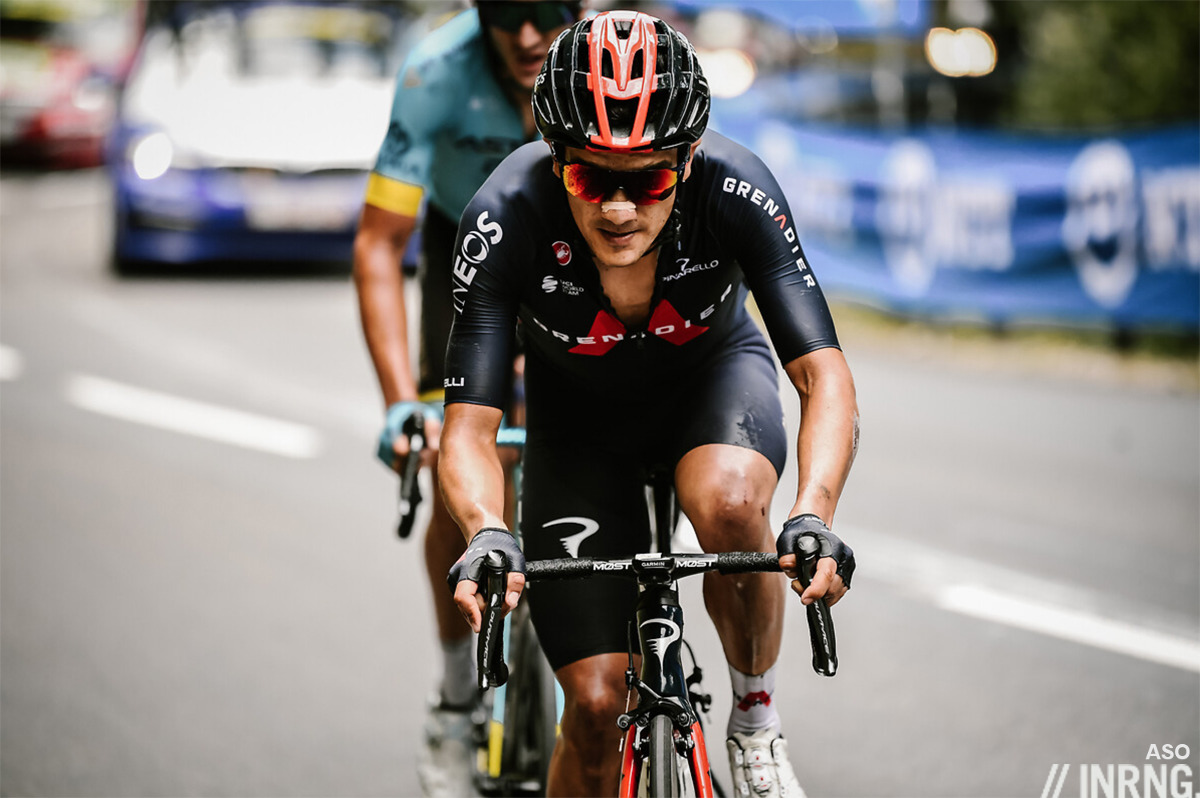
I’ll have a keen eye pn Felix Gall (AG2R Citroên Team). It is his first Grant Tour and he is riding it as a captain!
Which probably tells us more about the team that is quite bereft of riders who can genuinely go for a hig GC place than it does about the young Austrian’ – bu he did do quite well in Basque Country and inTour of the Alps.
One to watch and a clever signing by Ag2r, but I’ll be seeing if he can do well on a stage or two, harder to see him winning outright.
There is so many riders in contention i don’t think i could name a clear favourite so no 5 stars for me. Even carapaz, yates and almeida seem to have enough weakness’s in the past and some of the ones on the list really don’t have to be far behind if they are in career best form. Even Lopez and Landa would in the not to distant past be mentioned as with or above those 3.
I guess Carapaz because i presume he has a strong team is favourite but even so i would only give 3 stars. Yates i guess is next but no more than 3 stars because his team will not be strong enough for a long spell in pink leaving him to do to much.
Was tempted to leave the 5 stars blank but that can be a cop-out too and it didn’t reflect what I see as a hierarchy before the race, I do see Carapaz above the others for now. But happy for predictions to blown to pieces, it means an exciting race.
I think it’s fair reflection to put Carapaz on 5 – he is a GT winner – only Simon Yates comes to the race with that tag (and a realistic chance of GC). Otherwise what a chance for some of the nearly men.
Thing with Carapaz if he puts together 3 weeks of racing without an off day, he has won this race. The others need to some something, on one maybe even two days to get the time required for them to win.
I think you surely mean the crafty Phil Bauhaus. Unless you think he’s a bit of a kunst…
Chihuahua Meida looks like a decent bet to me, dogged, compact, not carrying much weight.
As always a class preview. Still I feel I stoically have to point out it’s Alexander, and not Jeferson Cepeda lining up for uncle Savio.
Jefferson Alexander, rather than Jefferson Aleveiro Cepeda, his cousin at Caja Rural.
I wonder if MVP will win the first 3 stages? Almeida for the win, Landa for the podium. I wonder which of those 3 things is most likely?
Landa for the podium… maybe? His luck has to turn at some point.
“Landa’s reputation precedes him now, the myth is further up the road than the man and to mention him is to imagine him attacking uphill in the drops… then falling over or falling ill.”
This is an interesting line on Landa.
He’s obviously a graceful rider but I’ve said before that his palmares is basically the same as Rafał Majka’s – except Majka has had more recent grand tour success (and an Olympic medal, if that counts for anything).
You can argue Landa’s never fulfilled his potential, while Majka has maximised his, and I’d agree with that, but this Giro is probably Landa’s best opportunity to put that right and grab a grand tour. Good luck to him.
I get your point, and quite much agree, although focussing on the palmarés in Landa’s case is a bit like trying to understand Indurain’s greatness from one-day races ^__^
However, I’m not sure about Majka maximising his winning chances. After all, from 2016 on he just got that couple of Vuelta stages and very little less, besides being a valuable gregario. I think he didn’t ever get again any GT top-10, barring 2019 of course.
Perhaps I’m partially biased by the fact that I consider him a very gifted climber, too, albeit not as much as Landa, whose attitude’s limits, on turn, were well-known since the early Martinelli times.
Anyway, Landa, also working as a gregario most of the time, was very solid in GTs from 2017 to 2020 both included, and came painfully close to grab further podia both at the Tour de France (2017) and the Giro (2019). That’s what people might not notice from a general look to his palmarés, but which is nevertheless a clear perception for whomever thinks back about those races. Especially given the handicap implied by his lack of full focus at the beginning of those races (a legit sporting flaw in itself, which is part of the game, no doubt).
“Landism” is about that ^__^ A little like Contador not podiuming in GTs, he either won or ended a little back because he had tried something crazy. I suspect he ended up doing that on purpose, like, if he happened to be close to podiuming I bet he’d lose time on purpose 😛
Yeah, fair point about Majka post-SaxoBank. He never repeated those Tour results at Bora, went a little stale, although some good Vuelta performances. UAE is a good financial choice for him, I’m sure, but it probably means the end of any big results for all the obvious reasons.
I do get why people love Landa, really, as he does have something different about him and at that 2015 Giro he was just floating. In all honesty I’d forgotten how close he was to the podium at the 2017 TdF and if he was on a different team to Froome that year he might have been his closest rival.
Genuinely wish him all the luck at this year’s Giro – would love to see him, Yates and Carapaz fighting it out. Would be a great thing.
It says something when the unasked question at today’s press conference for the favourite was “why are you not planning to be in France in July?”. Richard Carapaz is Ineos’ main GC rider but has clearly decided discretion is the better part of valour and is going to leave others tilt at windmills, aiming for two GT wins in one year is still a big prize. If he can avoid the usual Giro elephant traps, he must be a strong favourite.
Never been convinced by Simon Yates, the demise of his 2018 effort on the road to Prato Nevoso has probably faded from his memory but nothing I have seen since suggests he can win a Giro. The team doesnt convince either.
This might be the year for Joao Almeida, there are no big mountains and the final day TT is an advantage though I can see him hitting a bad day at just the wrong moment.
The romantic choice would be Romain Bardet, but there is the boring practicality of being able to ride a reasonable TT. Cant see him being able to build a big enough lead in the mountains. The rather odd team management hardly help.
I would dearly love to see the Tom Dumoulin of 2017 & 2018 back in with a chance of winning, he was an exciting and thoughtful competitor. Sadly since the crash on the outskirts of Rome in 2019 he has not been the same. Unfortunately cant see that changing over the next three weeks.
Is anyone running a book on how many doomed attacks we shall see from Vincenzo Nibali, or will he manage to pull off one last stage victory in the mountains for the Tifosi?
Last but not least, hope to be cheering at least one victorious sprint from the evergreen Cav!
Carapaz got on the podium in the Tour and realistically he could try again in July for this but hard to see more. He’s also in contract talks (Movistar very interested, Ineos can of course give him a new deal) but the outcome of the race probably won’t influence this much, he’s a known quantity now.
Isn’t there beef between Carapaz and Movistar? Didn’t they chase him down – helping Roglic – in one of the final stages of the Vuelta?
There was but sort of, the beef was more with his agent Giuseppe Acquadro because Movistar felt he’d sold/placed him to Ineos and they didn’t get a look in, to the point they swore they’d never hire a rider from his stable again following more issues with the Amador move and Carapaz not riding the Vuelta for Movistar while still on their team. But that didn’t last long and the team are now hiring Acquadro’s clients again.
That didn’t prevent them from signing Superman López. And so we got a brutal third season of “El día menos pensado”!
Feels like a year where the winner comes out from the shadow and isn’t getting any rings.
EF in the past have had slow starts to the season only to pick it up when the Grand Tours start. Recall, I’m a fan, Hugh Carthy is the rider I’ll be hoping for.
3 weeks coming up. Attrition drama…
Probably fair enough to have Carapaz as favourite but the Giro has never been a race where Sky / Ineos have been able to properly smother as they’ve done elsewhere.
I see that to be the case again this time around.
Whether the leader is Carapaz or someone else in the last week, I don’t see huge gaps on the top GC positions also, certainly as far as the podium is concerned.
I think it will be all to ride for going into the final day’s TT, and therefore those on-the-road unholy alliances are likely to spring up, quite possibly to the detriment of Ineos.
Sky/Ineos have won the last four in a row and I don’t remember any of them involving smothering the other teams. It might be my fading memory, though.
Whoops – of course Carapfz was Movistar – 3 of the last 4.
Only Bernal’s win was achieved with any degree of (some) comfort, they’ve not been able to defend the race with the train tactic as was suggested?
Mollema can complete his trilogy of GT stage wins. He tried hard last year, was in the break plenty of times but came up short form-wise. Probably see him lose time early and try to join breakaways.
Magnus Cort who will ride his first Giro has said that it is his goal, too. The crash and the fractured collarbone on the final stage of Tirreno-Adriatic, however, mean that he is not in top shape and that the general idea is to build form for the Tour. But no doubt we’ll see him in a breakway or two during the second or the third week!
Another rider who is going to do the Giro-Tour double is, of course, Mathieu van der Poel. I’m as much a fan of his as the next guy – and his presence in the race is one more reason why I’ll stay glued (and probably waste a couple of valuable hours when I could be out there riding…)!
Looks like a bit of a consolation race but one or more new faces may emerge.
Looking for something special from the only Welsh speaker in the professional ranks, Eduardo Sepúlveda.
Please add me on the list looking something special from Eduardo Sepulveda albeit for a different reason. He, like me, is Argentino. Aguante Eduardo !!!!!
When he first emerged as a pro he was seen as a real talent, a possible GC contender even. That hasn’t happened but his riding in Turkey recently was impressive and if this was a build-up to the Giro rather than peak Sepulveda then he’ll be one to watch on any hilly/mountain stage.\
I know the Tour de France is broadcast in Welsh and it sounds as impossible as Basque to outsiders.
I’m sure there’s an interesting story there!
In the meantime, there’s also this: https://i2-prod.walesonline.co.uk/incoming/article7885028.ece/ALTERNATES/s1200c/1Swansea.jpg
I think Owain Doull might have a comment on that!
Is he? Great to know.
He’s not the only one though. Owain Doull who’s racing the Giro speaks Welsh. Stephen Williams of Bahrain Victorious does too.
There’s also the Welsh speaker with the most incongruous English accent in professional cycling – Dave Brailsford.
Thanks as ever for the great preview, INRNG. Looking forward to an exciting Giro.
Just one quick error: “Ineos having won the last three” in the paragraph about them isn’t right, its the last two or three of the last four.
I would expect Ineos to fire-up the train for the post-Hungarian stages – dictate the speed and keep Carapaz out of trouble. The down side would be if Dumoulin or Almeida can ride the train too. Would not surprise me if Carapaz wins the GC without winning a stage – the other contenders are good enough to win stages but the GC? A lot of maybes, but definitely a chance for a young rider to make his mark and I can see breakaways given more leeway when it gets lumpy.
I do love it when the break hangs on. One of the joys of last year’s Giro was the number of stage winners for whom it was their first pro win.
Good point, so many breakaways stayed away for the day last year. It was hard to pinpoint why, just that the GC teams could let the others go away once they’d lost enough time. I think we could see more of that, plenty should be far down on GC from Etna onwards and the gaps will only open up more.
Dare I hope for Landa? I had previously given up, but this is not a strong field, and I feel he might have been able to beat Carapaz in 2019 had he not been his team mate. I’ve never been convinced by those who claim he could have bested Contador in 2015 – Contador looked too strong – but these occasions of being held back by his team (in my view, rightly in 2019; not in 2015 where Aru was clearly not the better rider and had no chance of winning) add to my desire to see him finally live up to his potential.
I’m going to be disappointed, aren’t I? But I don’t really care who wins as long as we see a close race, which seems distinctly possible.
I agree. I always hope for Landa to do well, but this year, I have all but given up, as it’s been a few years since he has shone in a bike race. There were a few years where he was, I believe, one of the top two climbers in the world (he and Froome), but I haven’t seen anything like that since pre-Covid. He has a style/attitude on the bike that I really like, a sort of “I don’t give a sh*t, I’m just going do things my way”, even when he’s on Team duties, like towing around Carapaz/Froome, like he’s suffering fools. It would be nice to see him shine again.
Landa is like the Don Quixote of climbers.
He needs a Sancho Panza, either on his team or in the team car, to repress his mad attacks.
I doubt that Froome ever was “the top climber in the world”, even if, as I’ll underline below, there’s maybe some chance for an isolated season. It would mean often and/or consistently getting a margin on the rivals specifically on climbs, possibly a different set of them, not on a centrepiece of sort usually well-prepared by the team both on the road and before in order to focus on a 10-15 minutes maximal effort.
He surely was no top climber in 2014, 2015 or 2016, when he often lost the direct, big confrontations on that terrain to other candidates like Contador or Quintana. 2017 could be an interesting year, but I find it very notable that he’d have lost the TDF to Urán or Bardet hadn’t it had those few but decisive ITT kms (it would have been a close call with Landa, too). He couldn’t make such a difference over good but not phenomenal riders, and Aru or Dan Martin sometimes left him on his back foot. Please note that I’m not implying, not even by far, that he didn’t deserve to win or whatever: those TDF had a laughable number of ITT kms and surely Froome, taking at face value what happened on the road only, was the most deserving competitor then. 2016 was also shocking because the Ventoux gift: without that, both Quintana and Bardet would leapfrog Froome by a notable margin in a no-ITT GC (totally meaningless, this climber-thing apart). Obviously, with the ITTs duly included, the Ventoux accident becomex irrelevant in sporting terms, albeit still disgusting.
All the above is just about the idea of “top climber in the world”, which isn’t about being the best stage racer or even the best GT racer or even winning GTs (well, or we shouldn’t even name Landa, of course!).
In that sense, it’s also significant that despite trying very hard and with Poels’ help, Froome couldn’t reel in Contador on the Angliru at the 2017 Vuelta. Despite the Angliru disaster, Superman López looked more often than not to have a margin over the rest of GC men while Contador produced the most notable single performances after his early woes.
All in all, the most impressive climbing performance in 2017 were probably Quintana’s at the Giro, just half a minute short of a monstre-Dumoulin in the final GC despite some seventy (70!) kms of ITTs where he had lost over 4 minutes to the Dutch.
In 2012 the best climber in the world was Purito Rodríguez, no doubt, although he didn’t win as much as his physical shape would have deserved: well, the Flèche and Lombardia, plus 2 stages at the Giro and 3 at the Vuelta, with all sort of uphill finishes, 2 at Itzulia, the Marche’s walls at Tirreno. Surely, he was just runner-up at the Giro because of a magical Hesjedal and got squashed between Contador and Valverde down to third place at the Vuelta (the three Spaniards all above Froome), but we’re speaking of climbing.
In 2013 Froome has indeed a strong point of sort but he also lost some significant direct duels and we lack more clashes with Nibali, the other candidate that year, who would confirm in the 2014 TDF that he was having a career peak in terms of climbing performances. Neither would hit such consistent heights again in the following seasons, despite an impressive number of notable performances and great overall victories by both.
Finally, shocking as it may seem, especially to Larry T, I’d defend that Simon Yates was probably the top climber in the world in the 2018 season ^___^
oh garbriele, I remember…I remember. To suggest anything other than Froome was one of the best climbers of his era is simply wrong, in my very humble opinion. If it was someone else, I might be inclined to go on, however in this case, I will try to listen to my beautiful girlfriend and attempt to “rise above young man, rise above”. Go Landa Go!
Look how did that change… ^___^ That Froome, at face value on the road, was “one of the best climbers” is reasonable, saying that he sat as the top one is a whole different affair, although it might make sense for 2013 as a shared place.
Landa at his absolute best would lose a couple of minutes to the favourites in the first week, plus a minute or more to a rival leader in his own team. Then a bit more in a time trial. Then he’d start climbing well in the last week but be unable to attack because he’d now be in support of his team mate and he’d finish somewhere around 3rd or 4th. That’s Landa at his absolute best. He’s not at his best anymore. Far from it. I’d say he’s got less chance of winning than Lopez I.e none at all.
Of the teams who have a possible GC candidate Ineos, Bahrain, Bora, Jumbo, Movistar, UAE and DSM look have the team capable of defending while BikeExchange, Trek, EF and Cofidis probably don’t. If Yates is to win he’ll have to hang back and avoid the lead – but also avoid losing more than a minute – before stage 17 or so, leaving stages 19 and 20 in which to make his cimbing tell and provide a small margin for stage 21.
That’s the theory. Now for the surprises. I have a little fancy for Bardet without the pressure of riding in France for a French team.
What’s happened to Larry? Has he been banned on gone off in a huff, because of disagreements over disk brakes? I might not often agree with him but his comments about his favourite race (especially as it is going to visit Sicily) are often worth reading.
Hopefully he’s just in the Dolomiti without Wifi. Or Sicily.
He was involved in an argument over whether apoplexy and a stroke were the same thing. There are no winners in that one.
http://cycleitalia.blogspot.com/2022/05/its-giro-time.html
I’m enjoying the peace and quiet.
Perhaps he’s gone for a much-needed lie down in a darkened room and will be back to comment once the Giro starts.
I like Bilbao for a podium and Almeida for the win!